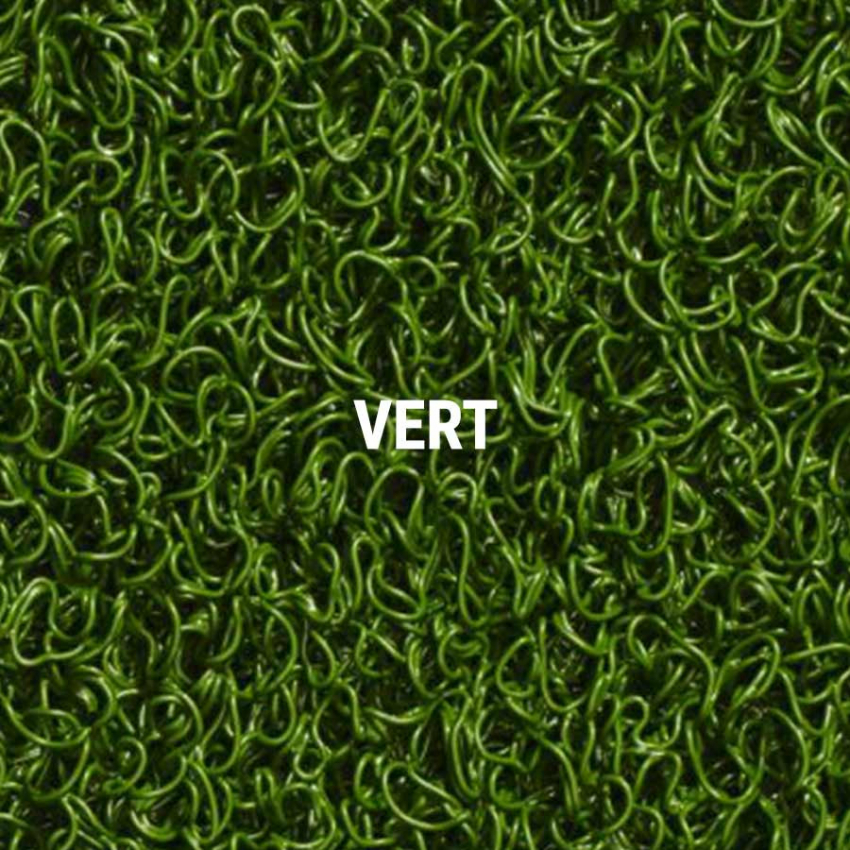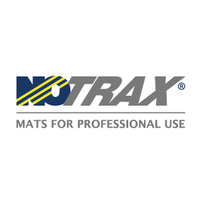






































The looped surface of this spaghetti entrance mat scrapes dirt and removes moisture from shoes while capturing them to prevent dirt from entering buildings.
Flexible and robust, the mat resists UV rays, various weather conditions, and adapts to all surfaces.
2 models available:
With sole: better grip on the ground
Without sole: effective drainage of liquids (water)
Available in rolls, linear meters, and customized in 7 colors.
Total absence of harmful and toxic substances (e.g., DOP, DMF...), substances harmful to the ozone layer, silicone, or heavy metals.
RECOMMENDED APPLICATIONS:
Freely laid on the floor with the addition of borders or in entrance pits.
High-traffic areas.

| 274C0048RD |
Data sheet
| Format | Roller |
| Type of fiber | PVC buckles |
| Design | Spaghetti curls |
| Location | Exterior Interior Outdoor under cover |
| Intensity of passage | Very intense |
| Properties | Draining Fire resistant Non-slip Scraping |
| Thickness | 14 mm |
| ERP category | 1 (+ 1500 passages) 2 (701 to 1500 passages) 3 ( 301 to 701 passages) |
Anti-dirt-repellent mats are the first line of defense in keeping dirt and debris out of buildings. They improve air quality, reduce noise resonance, extend floor life and cut maintenance costs.
Dirt-repellent mats also facilitate access for people with reduced mobility, while ensuring the safety of all users (avoiding falls, slips, etc.). But they also contribute to the cleanliness and hygiene of your premises, while enhancing your image, since the entrance is the first impression your customers will have of your establishment.
To cut a long story short, a dirt-repellent mat must meet 3 main criteria:
When choosing an antisoiling mat, there are a few criteria to consider:
Your environment:
Type of traffic :
There are 3 ranges of dirt-repellent mats:
Professional dirt-repellent mats are used in all establishments with one or more entrances, such as :
We offer a wide choice of dirt-repellent mats:
Custom mats meet a number of objectives, not only for cleanliness but also for communication. They are innovative communication tools that will make you stand out from your competitors and standardize your franchises.
They can be used to welcome your customers in your image, give you visibility from the outside and attract passers-by who don't yet know you. They can also be used as a gift from you to your partners, or as a point-of-sale advertising tool.
You can use personalized mats for :
To choose a customized mat, you first need to know your needs:
Then choose where to place it: indoors or outdoors.
Customized mats help you stand out from your competitors, make your entrance look as good as your brand image, attract passers-by if the mat is outdoors, advertise in an innovative way.
We offer you a range of customized mats with different functionalities and a wide choice of colors.
We can offer you visuals, provided you give us your personalization requirements: logo, company name, details of services offered, etc., and we'll send you a mock-up.
Retains virtually all dirt thanks to an ingenious combination of technical entrance mats mounted on aluminum profiles and cleanliness coatings.
Ideal for the heaviest traffic, over 1,000 passages per day, and withstands caddies, carts, baby carriages and suitcase wheels.... Reduces the risk of slipping on wet floors and the cost of cleaning your entrance. Suitable for high-end building entrances that require a bright mat without loss of quality.
Aluminum mats are used when an entrance is used by more than 1,000 pedestrians or wheeled loads per day. When the reception area is divided into 3 zones (outside, inside entrance, inside building)
When choosing an aluminum mat, there are a few criteria to take into account:
(Reps ensures dirt pick-up and moisture absorption. Rubber and brushes only capture dirt).
We offer a wide choice of colors to match your interiors.
Several cladding styles to choose from:
Flexible, customizable combinations of different types of matting for complementary, consistent action whatever the configuration of your entrance.
Industrial mats meet the needs of ergonomic workstations and employee well-being.
They prevent:
There are many uses for industrial mats:
Safety criteria: The mat must cover the entire workstation, be firmly attached to the floor, not shift or slide, and have bevelled edges to prevent falls.
Thickness and flexibility criteria: Contrary to what you might think, you shouldn't choose a very thick or very soft mat. The mat should have a certain elasticity, but still allow a comfortable standing position, without the user feeling slumped.
Environmental criteria :
Environmental hazard criteria : To establish more precise characteristics for a mat (antistatic properties or fire resistance etc...) we need to take into account the hazards present in the environment where the mat will be installed.
Where hazardous liquids are present in the working environment, the anti-slip properties and chemical resistance of industrial mats should be taken into account. The presence of openings on mats to allow the evacuation of fluids is essential.
Traffic criteria: We need to take into account the traffic that takes place on the equipment: how many workers can walk on it? How often, etc., in order to choose the most suitable mat.
Prevent the many problems associated with poor workstation ergonomics: RSI, static shock, bacterial proliferation, etc.
We offer a wide choice of industrial mats: on rolls, in standard sizes, made-to-measure or modular mats to suit all types of workstations.
Grating is a square slab of metal, polyester, rubber or PVC, made up of several parallel slats. The slats come in a variety of sizes, species and colors, and are grooved to prevent water from stagnating and the floor from becoming slippery.
Polyester gratings: Food industry - Paper and cellulose industry - Pharmaceutical industry - Plastics industry - Fiber and textile industry - Automotive and aircraft construction - Offshore installation - Sewage treatment plant - Navy and shipbuilding - Transport - Pickling and galvanizing plant.
Rubber gratings: Can be used in a wide range of applications: building entrances, walkways, stairs, access paths, production lines, ski resorts, etc.
Hygienic gratings: swimming pools - changing rooms - saunas - hotels - kitchens - steam rooms, etc.
Metal gratings: Thermal, hydroelectric, nuclear and solar power plants - Chemical and oil industries - Automotive and steel industries - Shipbuilding - Cement works - Metal processing and construction - Railways and transport
Test one outdoor anti-slip mat